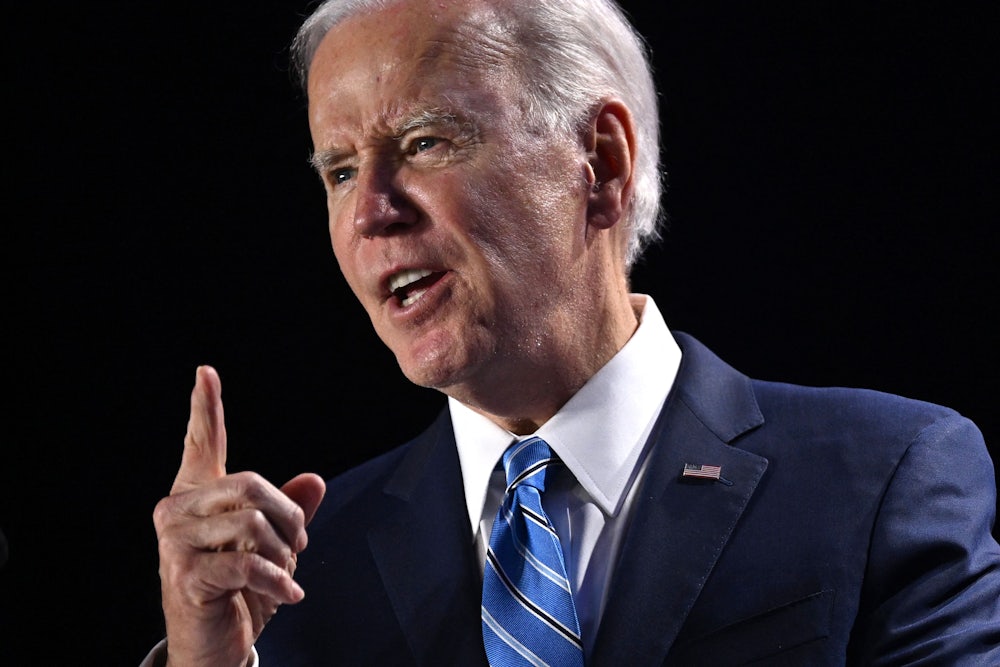In mid-February, workers at a Tesla factory in Buffalo, New York, announced their intent to form a union. A day later, many were fired.
The timing put the White House in a bind. Not 48 hours before, President Biden had unveiled a breakthrough in talks with the company about opening a portion of its proprietary charging infrastructure to non-Tesla cars. The administration surely would have preferred to celebrate the removal of a roadblock to the widespread adoption of electric vehicles. Instead, it looked like the self-described “most pro-union president” had just inked a deal with a union-busting billionaire.
Tesla’s animosity toward unionization efforts—the company maintains the workers were fired as part of a routine performance review—challenges Biden’s commitment to America’s workers. It’s a fight Scranton Joe should relish. The president needs an excuse to burnish his labor record, given his decision last autumn to force rail workers into a contract without paid sick leave. Now, with the imminent nomination of Julie Su to lead the Department of Labor and with the Protecting the Right to Organize, or PRO, Act’s reintroduction to Congress, the Biden administration should up the ante. The president needs to make clear: He will not tolerate corporate retaliation against workers exercising their legal right to collective bargaining.
In the absence of a strong pro-labor response from the White House, companies will keep testing the bounds of what the president will countenance when it comes to union activity. It’s not just Elon Musk, Tesla’s pugilistic chief executive, who is resisting efforts to organize America’s emergent clean energy workforce. The dust-up in Buffalo is just the most recent sortie in a larger war over who controls—and who benefits from—the transition to a clean energy economy.
Take the solar industry. In 2019, workers at a solar company in New York voted to form one of the industry’s first unions. They were summarily dismissed and replaced with subcontractors. Temp agencies have pounced on this strategy, cashing in on last summer’s spate of clean energy spending bills by flooding solar construction with cheap labor. As a recent report from The American Prospect details, even unionized solar workers struggle to get properly trained and designated as electricians. As the industry booms, conditions deteriorate.
“When I think climate change,” Biden is fond of saying, “I think jobs.” This is a savvy political maneuver: To make climate action palatable to the public, the president took a cue from the Green New Deal in framing decarbonization as a patriotic duty that would supercharge the clean energy economy and generate millions of jobs. But as the news in Buffalo makes clear, not all climate jobs are created equal. Some are subject to the whims of capricious billionaires. Many are physically and mentally exhausting. Few of them are currently union jobs. All of them, however, deserve the protection of the White House in their right to organize.
Even with his legislative agenda stalled in a gridlocked Congress, Biden has options. He cannot muscle through the PRO Act, a major priority of the labor movement, but he can condemn the brazen tactics of Musk and his ilk. With his choice of Su to replace Marty Walsh as labor secretary, he seems to be signaling his interest in having the Labor Department more aggressively enforce the National Labor Relations Act. He also can issue an executive order to deny federal contracts to companies that intimidate or retaliate against workers.
Whether Mr. Biden will do these things is another question. As much as he likes to style himself as a union man, the president has been losing his credibility with labor for months. He started his term strong by cheering on the unionization effort at an Amazon warehouse in Bessemer, Alabama—affirming the workers’ right to organize, a simple but nevertheless rare intervention from an office historically loath to spar with corporate America. By the end of last year, however, he was calling on Congress to avert a strike from the nation’s railroad workers, despite most union members voting down the contract. Abandoning his blue-collar bona fides is not smart politics: While Mr. Biden’s approval rating hovers near historic lows, approval of labor unions is reaching historic highs.
The battle happening right now is the opening gambit in the war over America’s clean energy future. On the one side are titans of corporate America like Musk, temp agencies that fill construction demand with poorly trained and poorly paid gig workers, and companies that stand to reap millions in tax breaks from the federal government. On the other side are workers like Zahra Lahrache, one of the employees at Tesla’s Buffalo factory who, in an interview with The New York Times, noted the irony of scraping together a living while on the payroll of one of the world’s richest men.
While Biden thinks of himself as a peacemaker, actions like those favored by Tesla management will make it increasingly difficult for him to avoid picking a side. He needs to get off the sidelines and champion a worker-led clean energy economy.






